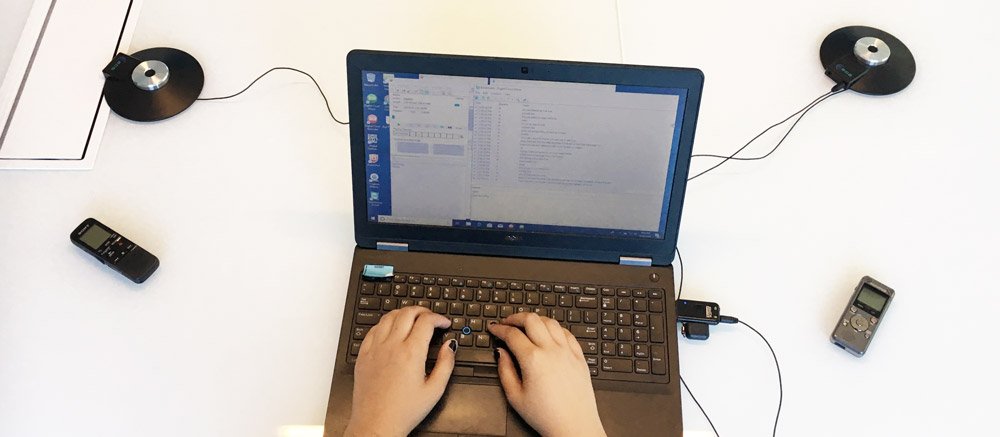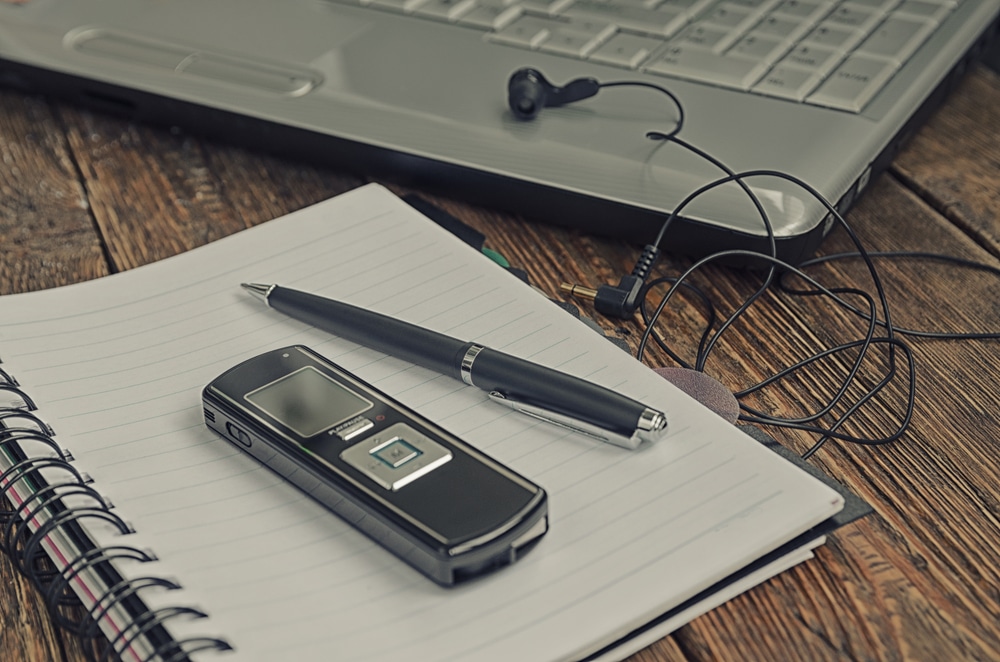Avoid These Pitfalls When Hiring for durham reporting Needs
Avoid These Pitfalls When Hiring for durham reporting Needs
Blog Article
Comprehending How Court Reporting Works: A Trick Element in the Justice System
Court reporting plays an important function in the legal system. It assures that all court room process are documented accurately. Court reporters use customized devices and strategies to develop verbatim records. These records serve various objectives, including allures and legal clarity. Recognizing the ins and outs of court reporting exposes its relevance in maintaining the stability of justice. What challenges do court reporters deal with in this evolving field?
The Function of Court Reporters in the Legal System
Stenotype reporter play a necessary function in the legal system, making certain exact and dependable documentation of court proceedings. They are in charge of capturing every talked word throughout tests, hearings, and depositions, creating a verbatim records that acts as a long-term record. This documents is important for appeals, offering a structure for higher courts to assess cases.In addition to transcribing spoken language, stenotype reporter also assist in communication in between attorneys, judges, and various other parties associated with legal matters. Their job advertises transparency and responsibility within the judicial process.Utilizing specialized devices and software program, court press reporters must remain concentrated and attentive, commonly functioning under stress to satisfy tight due dates. Their records are not only necessary for legal referral yet likewise for protecting the integrity of judicial proceedings. Inevitably, court reporters add significantly to the fair management of justice, making sure that all voices are heard and videotaped properly.
Crucial Skills Needed for Court Coverage
Court reporting needs an one-of-a-kind set of skills that are vital for accuracy and efficiency. Proficiency of stenography techniques, solid listening and understanding capabilities, and thorough focus to information are essential for success in this field. These skills enable stenotype reporter to generate reputable transcripts that act as important documents in the legal system.
Mastery of Stenography Techniques
While mastering stenography techniques is necessary for aspiring stenotype reporter, it calls for commitment and method to develop the necessary abilities. Stenography includes using a specialized key-board to record spoken words in actual time, making precision and speed crucial. Court reporters have to learn to utilize shorthand symbols and create muscle mass memory to ensure reliable transcription. Consistent exercise with dictation exercises assists in boosting keying rate, while knowledge with lawful terminology boosts comprehension during procedures. Moreover, recognizing the phonetic framework of the English language is considerable, as it helps in properly catching dialogue. Eventually, effectiveness in stenography not just helps with efficient interaction within the court room however additionally supports the integrity of the legal process.
Solid Paying Attention and Understanding
Efficient court reporting hinges not only on stenography skills however additionally on solid listening and understanding capabilities. Court press reporters have to actively pay attention to testaments, legal arguments, and dialogues, assuring they grasp the nuances of spoken language. This ability promotes precise transcription of intricate lawful proceedings, where every word matters. Comprehension prolongs past surface-level understanding; reporters must translate context, tone, and intent to record the significance of conversations precisely. In addition, they frequently experience specialized terms and jargon, calling for fast adaptation and retention of information. The ability to synthesize what is heard while simultaneously transcribing is vital, as it ensures the stability of the authorities document. Solid listening and comprehension are important in providing accurate and reliable court records.
Attention to Information
Attention to detail is a fundamental ability for court press reporters, enhancing their listening and understanding capacities. This precision assures that every talked word, inflection, and nuance is captured accurately in records. Stenotype reporter need to thoroughly note legal terminology, names, and complicated discussion to offer reputable documents for legal process. A minor oversight can bring about considerable consequences, potentially affecting case end results (durham reporting). Furthermore, stenotype reporter usually work under pressure, needing them to keep focus and accuracy in hectic settings. Their interest to information not just boosts the integrity of the judicial procedure however additionally fosters count on amongst attorneys. Inevitably, this ability is vital for creating records that serve as definitive records in court situations, ensuring justice is promoted
The Innovation Behind Court Coverage
As court coverage advances, the technology made use of by specialists in the field has actually ended up being increasingly sophisticated. Standard shorthand writing has actually largely been supplemented by innovative electronic devices that enhance speed and precision. Stenographic makers, outfitted with specialized software application, allow court reporters to capture spoken words in real-time, translating them into text immediately. This technology not only accelerates the transcription process however additionally reduces the possibility for errors.Moreover, voice acknowledgment software application is emerging as a useful property, allowing automatic transcription from audio recordings. This advancement supplies an option for creating records when a human press reporter might not be available. Furthermore, cloud-based storage services assist in simple gain access to and sharing of records amongst lawyers, making certain that important information is conveniently offered. As these innovations continue to advance, they play a critical role in preserving the integrity and effectiveness of the justice system, inevitably supporting the necessary job of court reporters.
The Refine of Transcribing Lawful Process
The procedure of transcribing lawful proceedings needs a blend of skill and modern technology to identify precision and performance. Court press reporters use customized equipment, such as stenographic devices, to capture spoken words in real-time. This innovation makes it possible for the reporter to transform discussion into message, ensuring that every declaration made throughout a trial index or hearing is documented.Once the session wraps up, the first transcripts undertake modifying for quality and coherence. Reporters might also include audio recordings to cross-reference and confirm the accuracy of their transcriptions. This thorough procedure assurances that the last document shows a specific account of the proceedings.Additionally, court reporters should keep a thorough understanding of legal terminology and court room procedures to efficiently translate talked language into written kind. Their experience not just help in producing trustworthy documents but also sustains the lawful system by providing vital paperwork for charms and future recommendations.
Ensuring Accuracy and Integrity in Court Records
Making sure precision and stability in court documents is extremely important for the judicial procedure. Court reporters play an essential function in catching procedures precisely, while innovations in technology enhance their capability to maintain high criteria. In addition, promoting confidentiality requirements is necessary to protect delicate details within lawful papers.
Function of Court Reporters
Court reporters play a necessary duty in the judicial system by capturing precise and verbatim accounts of lawful proceedings. Their primary responsibility is to assure that every talked word is recorded exactly, offering a trustworthy record that can be referenced in appeals and future situations. By making use of specific equipment and methods, court press reporters preserve the stability of the court record, assisting in openness and accountability in the legal procedure. They likewise assist judges, lawyers, and other attorneys by providing transcripts that are vital for comprehending case information and lawful disagreements - durham reporting. The accuracy of a stenotype reporter's work straight affects the outcomes of situations, emphasizing their considerable contribution to the search of justice and the guideline of regulation
Innovation in Coverage
Advancements in modern technology have greatly changed the area of court reporting, enhancing the precision and integrity of court records. Modern court press reporters utilize sophisticated tools such as stenographic machines and electronic audio recording devices, ensuring precise transcription of talked words. These tools enable for real-time transcription, which provides instant accessibility to court procedures and helps with prompt decision-making. In addition, software program programs furnished with advanced formulas aid in recognizing and remedying errors, even more strengthening the reliability of tape-recorded information. The combination of cloud storage space remedies guarantees that documents are safely archived and conveniently retrievable, reducing the danger of loss or damage. Generally, these technical advancements play a necessary role in keeping the top quality and reliability of court documentation in the justice system.
Preserving Discretion Specifications
A crucial element of court reporting is keeping confidentiality requirements, which are essential for guaranteeing the accuracy and honesty of court records. Court reporters are entrusted with sensitive information, requiring stringent adherence to ethical guidelines and lawful stipulations. This confidentiality safeguards not only the privacy of the involved events yet additionally the reliability of the judicial process. Reporters make use of safe and secure approaches for handling and saving transcripts, often employing security and limited accessibility procedures. Furthermore, they must browse the complexities of different lawful structures that govern confidentiality in different territories. By supporting these requirements, stenotype reporter contribute considerably to the integrity of court documents, fostering rely on the justice system and ensuring that lawful process can be conducted with miraculous expertise and regard for personal privacy.
Various Kinds of Court Coverage Services
While the lawful landscape remains to develop, the selection of court reporting solutions available has actually broadened considerably to meet varied needs. Standard court reporting continues to be important for capturing verbatim transcripts throughout trials and depositions. Nevertheless, additional solutions have actually emerged, including real-time reporting, which supplies prompt access to transcriptions as they are produced, beneficial for attorneys and judges.Video my website court coverage has likewise obtained popularity, enabling aesthetic paperwork of witness testaments, enhancing the record with non-verbal hints. Remote court reporting has become increasingly relevant, providing virtual deposition solutions to suit geographical constraints.Lastly, some court press reporters specialize in captioning solutions for the hearing damaged, making sure access in lawful procedures. This diverse variety of court reporting services allows lawful professionals to select one of the most ideal alternative for their particular scenarios, eventually boosting the efficiency and efficiency of the justice system.

The Future of Court Reporting in a Digital Age

As innovation remains to improve the lawful area, the future of court coverage is positioned for considerable modification. The integration of sophisticated tools such as synthetic intelligence and real-time transcription software program is coming to be significantly common. These advancements guarantee to improve the reporting process, enabling faster and much more accurate documents of lawful proceedings.Moreover, the shift towards remote hearings demanded by global events has increased the adoption of electronic systems, enabling stenotype reporter to look at this website work successfully from different places. This change also increases concerns concerning the conservation of conventional skills, as the focus on innovation can outweigh the nuanced art of shorthand reporting.Nonetheless, human stenotype reporter continue to be invaluable, giving context, emotion, and competence that devices can not replicate. As the lawful landscape progresses, a hybrid version that combines modern technology with human understanding might define the future of court reporting, guaranteeing its significance in an electronic age.
Regularly Asked Concerns

What Credentials Do Court Reporters Required to Work in the Field?
Court reporters generally require a high college diploma, specialized training in court coverage, and certification from pertinent specialist organizations. Efficiency in shorthand or voice writing and solid language abilities are essential for success in this area.
The length of time Does It Require To End Up Being a Certified Stenotype Reporter?
Ending up being a licensed stenotype reporter typically calls for two to 4 years of education and learning, consisting of specialized training and method. The period differs based upon private development, the picked program, and the accreditation process, affecting total conclusion time.
Can Court Reporters Work From Another Location or Just In-Person?
Court reporters can work both from another location and in-person, depending on the needs of a case. Advances in innovation have allowed numerous to give services by means of video clip conferencing, allowing flexibility in their workplace.
What Is the Ordinary Salary for a Stenotype Reporter?
The average income for a court press reporter differs by area and experience, usually ranging from $50,000 to $80,000 every year. Variables such as expertise and need can substantially influence private revenues within the profession.
Exactly How Do Court Reporters Handle Legal Lingo Throughout Proceedings?

Report this page